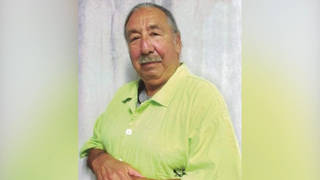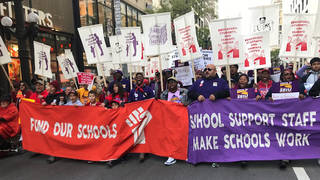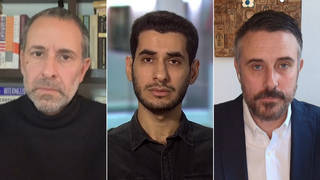
Related
Guests
- Jesse Hagopianhistory teacher and adviser to the Black Student Union at Garfield High School. He’s an associate editor for Rethinking Schools magazine and editor of the book, More Than a Score: The New Uprising Against High-Stakes Testing. He received the 2013 Secondary School Teacher of the Year award from the Academy of Education Arts and Sciences.
- Kshama SawantSocialist city councilmember in Seattle. Sawant helped win a $15/hour minimum wage for all workers in Seattle. She’s a member of the American Federation of Teachers, and she has joined Seattle teachers on the picket line.
Schools are closed in Seattle again today as the city’s first teacher strike in 30 years enters its fifth day. Last week, teachers, represented by the Seattle Education Association, unanimously voted to go on strike, demanding fewer standardized tests for students, more time to prepare for classes, and better pay. The impasse has delayed the start of the public school year for about 53,000 students. The strike comes after Washington’s Supreme Court ruled earlier this month that the state’s new charter school system is unconstitutional.
Transcript
AMY GOODMAN: Schools are closed in Seattle again today as Seattle’s first teachers’ strike in 30 years enters its fifth day. Last week, teachers, who are represented by the Seattle Education Association, unanimously voted to go on strike, demanding fewer standardized tests for students, more time to prepare for classes, and better pay. The impasse has delayed the start of the public school year for about 53,000 students. The strike comes after Washington’s Supreme Court ruled earlier this month that the state’s new charter school system is unconstitutional. A number of Seattle parents have come out in support of the teachers. This is mother Lilith Lysistrata speaking to NBC.
LILITH LYSISTRATA: I think the district needs to buck up and pay the teachers what they deserve to be paid and give them the resources they need to be able to educate our children. I have four kids in the Seattle Public School District, and both my spouse and I work. This is tough on us, and—but I don’t want the teachers to fold.
AMY GOODMAN: To talk more about the strike, we go to Seattle to speak with our two guests. Kshama Sawant is a Socialist city councilmember in Seattle. She helped win the $15-an-hour minimum wage for all workers in Seattle. She’s a member of the American Federation of Teachers and has joined Seattle teachers on the picket line. And we’re joined by Jesse Hagopian, teaches history and is an adviser to the Black Student Union at Garfield High School, an associate editor for Rethinking Schools magazine and editor of the book, More Than a Score: The New Uprising Against High-Stakes Testing. He received the 2013 Secondary School Teacher of the Year award. He has been elected as a strike captain.
We welcome you both to Democracy Now! Jesse, let’s begin with you. Explain this, well, unprecedented for 30 years, teachers’ strike in Seattle.
JESSE HAGOPIAN: Yeah, thanks for having me back on the show, Amy. And I want to say that people often tell us that we are not teaching right now. But, in fact, I think that the educators of Seattle are teaching a great lesson, not only to our students, but to the entire city of Seattle, a lesson in solidarity, a lesson in the power of collective struggle. And we’re transforming this city. It’s electric on the picket lines, with families coming and delivering food. A group called Soup for Teachers has formed that brought soup and pizza to our schools in the last few days. And it’s really galvanized the community to the side of the teachers, because they know we’re standing up for the issues that matter most to our families.
We’re standing up for caseload caps for counselors. So, at Garfield High School, where I teach, there is 400 students for every counselor. And we have a hundred homeless students at our school, so there’s no way that that counselor can provide for the social and emotional well-being of that many students.
And we’re fighting for race and equity teams in every single building. You know, the Seattle Public Schools came under investigation from the Department of Education, which found that our school system suspends black students at four times the rate of white students, right? Which is part of the school-to-prison pipeline. And our union has put forward a demand that every single school in the Seattle Public Schools have a race and equity committee that can take up issues like that. And the school district said no. The school district said you can have only six race and equity teams in six different schools.
And our union is standing up for fair wages for educators, who have seen this city become a playground for the rich rather than actually build playgrounds for kids. And in fact, one of the major demands that the union put forward was that we have recess for our kids in Seattle, because a study came out that showed that dozens of schools were having less than 15 minutes of recess, and those schools were concentrated in high-poverty schools and schools that serve kids of color, because of this rise in high-stakes testing is demanding more seat time and kids filling in bubbles. And I’m proud to say that we already backed the school district down. And what I think could be the first guaranteed minimum of recess, we won 30 minutes guaranteed in every single—in every single school.
But there’s so much still left on the table, because high-stakes testing, I think, is going to be one of the most important issues that we continue to struggle over. They are trying to reduce the intellectual process of teaching and learning to a single score that they can use to punish our students, to punish our teachers, to label our schools failing. And our union is saying we need to remove the unscientific student growth rating from teachers’ evaluation that ties it to a test score, and that any testing beyond the federal mandate be jointly decided by the union and the district. And I think that’s a demand that is really connecting with our communities, because there was 60,000 families that opted their kids out this past year in a mass revolt against high-stakes testing. And in fact, I believe that across the country we are in the midst of the largest revolt against high-stakes testing in U.S. history, and I think our union is taking up an important social struggle that could dramatically transform education in our city and provide a model for educators across the country.
AMY GOODMAN: I want to ask about a piece authored by the president and vice president of the Seattle School Board. Writing in an article headlined “District to Striking Teachers: There is No Money Left” in The Seattle Times, Sherry Carrand and Sharon Peaslee point out that the district increased teacher salaries in the last six years when the state was not able to. They go on to say, quote, “We believe our proposed contract agreement offers a generous package that increases pay, adds dozens of teachers to reduce class size, and stretches but maintains fiscal health and sustainability. … [W]ith the current proposal, we’re out of revenue. There is no money left.” Jesse Hagopian, your response?
JESSE HAGOPIAN: Well, I think that that’s just shameful. And I’m really sorry that they wrote those words, because, in fact, we know that the state is not doing its constitutional duty to fund our schools, but we also know that the school district received $40 million from the state this year in discretionary funds that they can spend any way they want, much more than they’ve gotten in the past. And we also know this, that the salaries for the administrators in the district headquarters rose by 12 percent over the last few years, and that actually the salaries of educators have gone down some 1.3 percent in a study released by a parent who’s an accountant in the Seattle Public School District. And so, we’ve seen our healthcare costs rise and the cost of living soar as our city has become dominated by big corporations like Amazon, and in fact our take-home pay in real dollars has been totally stagnant as they’ve taken more—siphoned more and more money off for the central administration. And the teachers are saying enough is enough, and we’re willing to walk the picket line. As long as the families are bringing us food and solidarity and bringing their voice and collective struggle, we will fight back for the schools Seattle children deserve.
AMY GOODMAN: Kshama Sawant, why did you get involved with this? You’re a city councilmember.
KSHAMA SAWANT: Well, you know, the issues that the teachers are facing, the issues that Jesse was outlining, the issues that they’re willing to go on strike for, these are the result of decades of systematic attacks against public educations by successive Democratic and Republican administrations. And this is what it’s come to. And this comes on the heel—the Seattle strike comes on the heels of the massive Chicago Teachers Union strike. And we can see that the elected officialdom, including the Seattle School Board, they’re all cut from the same cloth. They are all beholden to the same agenda, where public education is going to be stymied at every point. And one of the main lines of attack to stymie public education is to attack teachers’ unions, because teachers’ unions are the real backbone to uphold the needs of all kids, regardless of race, regardless of income. And that is why I see my role, as a Socialist, as an elected public servant, as somebody who has been elected on the mandate of serving the working class—it is absolutely essential for me to be on the picket lines.
And as you might have heard, we had a real success yesterday at City Hall. I introduced a resolution—this is an official statement from the City Council—that stands in solidarity with the striking teachers. And we got a unanimous vote on this. You know, for those of the people out there who believe, like us, that there is a need for independent, working-class politics, and that we need our own candidates put forward, but it can’t work because our voices will be lost among corporate voices, this is an inspiring example how when you have even one of our grassroots voices in the halls of government, we can make a huge shift. And the simple reason we can do that is because the success that I’m able to have inside City Hall reflects the overall mood of resistance that we have in society right now. The Seattle teachers taking a stand, courageous stand, right now is a symptom of that mood of resistance. The Fight for 15 and the victories we’ve had is a symptom. And I really urge everybody who’s watching to join actively in the ongoing struggle.
AMY GOODMAN: So, last night at City Hall, Jesse Hagopian, can you explain what that meeting meant to the teachers? And were many teachers there?
JESSE HAGOPIAN: Well, I think it really was a game changer. We came down in a delegation of educators from around Seattle to the City Council meeting, and we heard Kshama introduce a wonderful resolution in support of the strike. And then I heard my colleagues from Garfield and other schools speak so powerfully about why we were on strike. One of my colleagues, Nathan Simoneaux, explained his paycheck to the City Council and how every month he owes $57, after paying his student loans and the soaring cost of rent, and how he wants to stay in Seattle, but he just can’t afford it. Another colleague explained to each of the city councilmembers, reminded them of the history, the fact that they either attended Garfield High School or their kids attended Garfield High School, and the service that we’ve provided for this community.
And then to see a unanimous vote of the City Council in support of our strike really gave us confidence. And I think it’s going to give our bargaining team confidence to stand up for the schools our kids deserve and to not back down on any of these important demands that I think are connecting with some of the most important social movements in our country. We have the demand for race and equity teams that I think connects so importantly with the Black Lives Matter movement, that’s demanding not—we don’t just want not to be shot down in the streets by unaccountable police. When we say Black Lives Matter, we also mean that we want a rich and fulfilling life and access to education. And I think that that demand connects with so many of the demands of the Black Lives Matter movement, also the fight for a living wage. That’s what our union is doing. And we hope to raise the bar of wages in Seattle for all workers. I think that this fight is also a fight for women’s rights, because we have a majority female profession. And I think that it’s important that we get equal pay for this majority female profession. And so, I think that our movement is really connecting with some of the most important social movements, and we’re just going to gain strength as the strike goes on.
AMY GOODMAN: And what would bring you back into the schools? What would end the strike? What is your key demand, Jesse?
JESSE HAGOPIAN: Well, I’ll go back into the classroom and begin teaching when there is a basic level of respect for educators and when we achieve a contract that respects our kids. And I think some of the key demands that need to be met are an end to the student growth rating, an end to tying teacher evaluations to test scores, and a cap on our counselors’ caseloads so that they can actually provide the individual services our kids deserve.
And I think it’s really a shame that the Seattle School District waited until the very end of the summer to respond to any of these really important reforms that the union put forward. And it’s because they waited until just the last days before the school year started that this strike happened.
Even though they want to blame the union, I think it’s important to see that the union is actually representing the will of parents, students and teachers in a collective struggle to transform public education and make it about empowering our students to solve problems in their community, to identify injustices, to solve those problems and gain the critical thinking skills, the collaboration skills they need to create a better world, rather than just learning how to eliminate a wrong answer choice or fill in a bubble. And that’s a vision for public education that I’m willing to strike for.
AMY GOODMAN: Well, I want to thank you both very much for being with us. Jesse Hagopian teaches history and is an adviser to the Black Student Union at Garfield High School. He’s an associate editor for Rethinking Schools magazine and editor of the book, More Than a Score: The New Uprising Against High-Stakes Testing. And thank you so much to Kshama Sawant, a Socialist city councilmember in Seattle. She spearheaded the move and the passage of the $15-an-hour minimum wage in Seattle.
This is Democracy Now! When we come back, we’re going to look at the relationship between the United States and Bolivia. What is this secret Operation Naked King that targets the president of Bolivia, Evo Morales? Stay with us.












Media Options